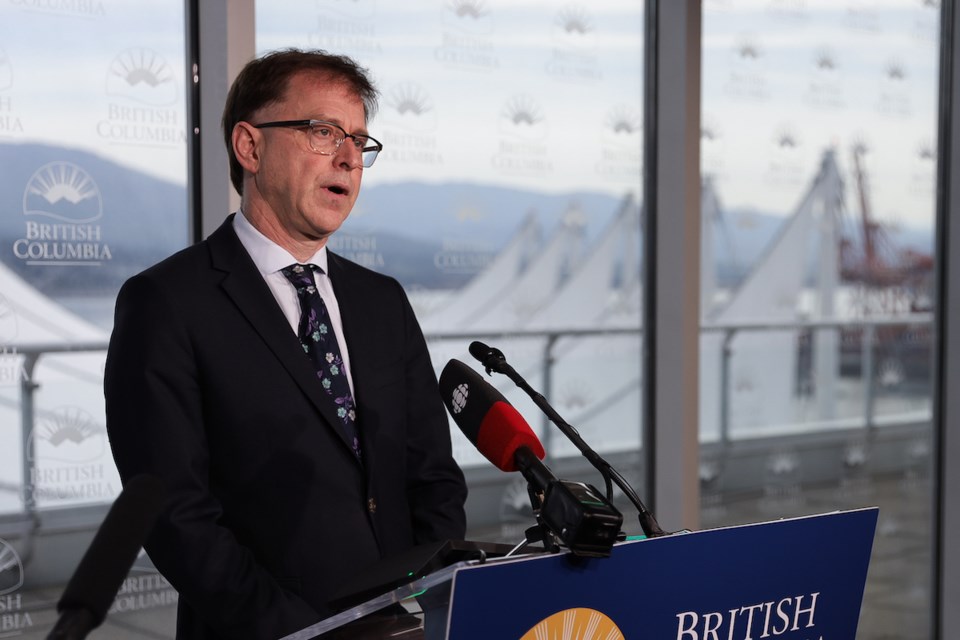The province is investigating allegations of staff in hospital emergency rooms playing a “game” to guess the blood-alcohol level of Indigenous patients.
Health Minister Adrian Dix said the allegations were brought to him Thursday night. He did not say where it was alleged to have happened.
If the allegations are true, the practice is “intolerable, unacceptable and racist and, of course, affected profoundly patient care,” Dix said at a teleconference Friday. “Playing a game of that sort is beyond unacceptable.”
Premier John Horgan said in a statement that he is “outraged by reports of ugly, anti-Indigenous, racist behaviour at multiple health-care facilities in B.C.”
“This behaviour degrades the standards and provisions of health care in our province. It cannot stand. There is no excuse. There is no explaining this away,” Horgan said. “If confirmed, this is a heartbreaking example of systemic racism in our province.”
Dix has appointed Mary Ellen Turpel-Lafond, B.C.’s former representative for children and youth, to investigate.
He said the health-care staff being investigated have not been suspended or fired. “They are serious allegations. They obviously need to be investigated so that we can determine the extent of them.”
Daniel Fontaine, CEO of the Métis Nation B.C., told the Times Colonist he was recently made aware of allegations that emergency-room physicians, nurses and other staff regularly play a version of the TV game The Price is Right when predicting the blood-alcohol level of Indigenous patients, where the “winner” is the closest without going over.
Fontaine said the allegations were made by a health-care worker who was participating in San’yas Indigenous cultural safety training, an online program aimed at building positive partnerships between service providers and Indigenous people.
That information was brought to the First Nations Health Authority, which alerted the Health Ministry.
“If these allegations are true and if these employees are, in fact, doing this, they should be removed from the health-care system immediately,” Fontaine said.
The Métis Nation B.C., which represents more than 90,000 Métis people across the province, and the B.C. Association of Aboriginal Friendship Centres said in a joint statement that First Nations, Métis and Inuit patients seeking emergency medical services in British Columbia are often assumed to be intoxicated and denied medical assessments, contributing to worsening health conditions resulting in unnecessary harm or death.
In a March 2019 report released by the San’yas training program, health-care workers reported cases where assumptions were made about Indigenous people that led to poorer care. For example, an Indigenous man with longstanding alcohol-abuse disorder died of head trauma after paramedics, triage nurses and a physician were dismissive of his injuries.
In another case, health-care staff assumed an Indigenous woman who was vomiting was drunk, even though she had cancer and was sick from the chemotherapy, the report said.
Leslie Varley, executive director of the B.C. Association of Aboriginal Friendship Centres, pointed to a “lack of will” to address systemic and specific racism toward Métis, First Nation and Inuit people.
“We know that our people avoid hospitals because we are afraid of having a discriminatory encounter,” Varley said in a statement.
“This happens to the point where Indigenous people end up in emergency with extreme diagnosis, like cancer.”
In his statement, Horgan said no one should fear discrimination when they need help the most.
“No one should worry that when they visit a hospital that they will be prejudged and given a lower standard of care,” he said.
Horgan said he’s confident Turpel-Lafond will thoroughly investigate and that the voices of anyone who has experienced racism will be heard.
“This will not be swept aside,” Horgan said.
“We will not look the other way when racism is exposed. We will get a full account and changes will be made.”
The province’s investigation will work in collaboration with First Nations councils and First Nations health authorities to find remedies, Dix said.
Boma Brown, founder of the Victoria-based Support Network for Indigenous Women & Women of Colour, said she’s not surprised by the allegations because she regularly hears from women of colour that they were not treated fairly by the health-care system. The network provides peer-support workers to accompany women to health-care appointments so they have someone to advocate for them.
Brown was disappointed that Dix did not immediately suspend the health-care professionals facing the allegations.
“These people are still taking care of patients and they have people’s lives in their hands right now,” Brown said.
“Medical institutions, hospitals, clinics should be safe spaces for racialized people.”
In a joint statement, the CEOs of B.C.’s seven health authorities said “racism has no place in our hospitals, our workplaces, or our society.”
“If true, this activity would be evidence of systemic racism and discrimination, underscoring the significant health disparities Indigenous people in our province experience,” the health authorities said. “Indigenous leaders have provided us guidance and support to eradicate racism in B.C.'s health system and we know there is still much work to do. We remain actively engaged with Indigenous partners on immediate and longer-term action plans to combat anti-Indigenous racism.”
The statement said the health authorities take such reports seriously and that any discriminatory behaviour in any B.C. health-care facility is a violation of their principles, policies and values.
Turpel-Lafond will make recommendations about immediate and long-term steps to address systemic racism in the health-care system. Dix did not provide a timeline for how long the investigation will take.
“It is beyond dispute that people have suffered in our province from systemic racism in many fields, and health care is one of those,” Dix said.
The Métis Nation B.C. and the B.C. Association of Aboriginal Friendship Centres said B.C. should follow Ontario’s lead and make anti-racism-training mandatory for health service workers. Currently, the San’yas Indigenous training program, which was developed by First Nations leaders and the Provincial Health Services Authority’s Indigenous health program, is optional.
“B.C. Health authorities are inconsistent in their requirements for anti-racism training, despite evidence that racism is prevalent within health systems,” the organizations said.



